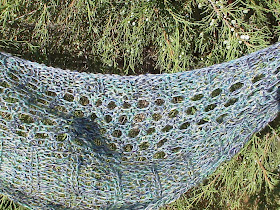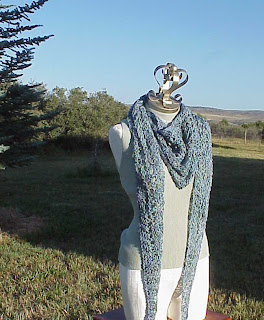Materials:
One circular needle size U.S. 11 (8mm). You will use a circular needle not to knit in the round, but to work flat and accomodate the large number of stitches. I used a 29" length.One skein of worsted weight yarn, approx. 189 - 200 yds.
2 Stitch markers (optional).
Gauge:
4 sts per inch in patt.Abbreviations:
dec = decrease yo = yarn overK = Knit beg = beginning
P = Purl BO = Bind off
Patt = Pattern K2tog = Knit 2 together
PM = Place marker Ktbl = Knit thru back loop
RM = Remove Marker Psso = Pass slip stitch over
Sl-1 = Slip 1 stitch
Kfb = knit in front & back of stitch
References:
Cast on at the beginning of the row, otherwise known as knitted cast on. Tutorial video here:http://www.youtube.com/watch?v=rdaZTBOJ7XU
Pattern (Patt)
K2, Ktbl, PDirections:
1. Using Long tail cast on, cast on 4sts.2. Knit
3. CO 4 sts at the beg of the row, {K2, Ktbl, P} twice. 8 sts
4. CO 4 sts at the beg of the row, {K2, Ktbl, P} repeat to end. 12 sts
5. Repeat row 4 until you have 96 sts.
6. CO 4 sts at the beg of the row, work patt for 16 sts, PM, K33, Kfb, K34, work patt to end. 101 sts.
7. CO 4 sts at the beg of the row, work patt for 16 sts, PM, K to last 16 sts, RM, work patt to end. 105 sts.
8. Repeat row 7. 109 sts
9. CO 4 sts at the beg of the row, work patt for 16 sts, PM, K1, *yo, sl-1, K1, psso, repeat from * to last 16 sts, RM, work patt to end. 113 sts
10 - 12 Repeat row 7. 125 sts
13. CO 4 sts at the beg of the row, work patt for 16 sts, PM, K1, *yo, K2tog, repeat from * to last 16 sts, RM, work patt to end. 129 sts
14 - 16 Repeat row 7. 141 sts
17 - 24 Repeat rows 9-16 once more, you will have 173 sts.
25 - 28 Repeat 9 - 12 once more, on the last row dec 1 st in the middle of the row. 188 sts.
29. CO 4 sts at the beg of the row, work patt to end. 192 sts
30 - 32 Repeat row 29. 204 sts.
33. Bind off in patt.
These scarves work up relatively quick and make great gifts or craft show items. As with all my patterns, feel free to make and sell as many you like.
Enjoy!
Kris
The
Madison River, a fly fishing mecca for serious anglers, was thus named
by Meriwether Lewis in 1805 as he and his Corp of Discovery traversed
Montana. The Madison River flows west then north through the mountains
of SW Montana to join the Jefferson and the Gallatin rivers at Three
Forks.

Here is the pattern
Click on the link below, you should be able to download or print from there by clicking on "File". If this does not work for you you may try switching from Firefox to Internet Explorer or vice versa. Worst case senario you can copy and paste the directions into a word doc and print it out. Enjoy!https://drive.google.com/file/d/0B_oZ8-XeMq3pSThCYjk3emkwejA/edit?usp=sharing





thanks... I cannot wait to see the 3rd in the series..
ReplyDeleteLOVE the series. LOVE the setting. My sister lives in the Bridger Mountains above Bozeman, so I've seen the beauty of the area. Thanks for translating that into knits! Can't wait for Jefferson!
ReplyDeleteI am in the middle of making the Gallatin scarf. I have had to restart it 5 times but that is my fault for not really keeping track of how many stitches I have cast on. Will be making this one also. These two are beautiful.
ReplyDeletethanks...I made two gallatin scarves and look forward to making them all!
ReplyDeleteThank you so very much for sharing these beautiful patterns--- i have made all three and don't know which one I love the best. They are all just so lovely!!!
ReplyDeleteGreat Pattern. Question: Row 6, "Kfb" after K34....what is Kfb? Knit from behind?
ReplyDeleteKfb means to knit in the front AND the back of the stitch, this will make an increase.
ReplyDeleteCompletely agree with so many of the comments. Both of your patterns knit up beautifully and are quite easy to follow.
ReplyDeleteHuge thank you for sharing and giving permission to use in selling items at a craft fair. You are more than generous, and I look forward to the next in the series, as well.
Victoria Lindgren - if you are referring to the Definitely Diagonal pattern, First you work the rows 1,2, and 3 of the setup rows. Then, as directed you work rows 4-16,you will THEN go back and work rows 1 - 16 repeatedly.
ReplyDeleteThese are beautiful! What kind of yarn did you use for the blue?
ReplyDeleteThe blue yarn was actually a blend of three strands of very thin cone yarn that I twisted on my yarn twister.
ReplyDeleteThis is my next proyect, i will be using two stran of araucania ñuble, it will be beautiful. thanks for the patterns.
ReplyDeleteI'm a little confused about the second row. The instructions say to cast on four at the beginning of the row and then so two repeats that include increases, which reads to me like six total stitches more than the four castes on. That makes ten and not eight as specified in the stitch count following the row.
ReplyDeleteUnfortunately, that makes the next set of repeats finish unevenly.
Please help.
Dear Annonymous,
ReplyDeleteYou had 4 stitches to begin with.
Now you follow as written.
The second row states:
CO 4 sts at the beg of the row, {K2, Ktbl, P} twice. 8 sts
You cast on 4 stitches at the beginning of the row (now you have 8 sts total),
you then [k2, ktbl, p], now repeat again [k2, ktbl, p] this makes it that you done that twice. A total of 8 stitches.
Kris...I'm making the Jefferson scarf now, but don't have yarn that quite comes up to gauge...it seems to me the way your scarves are written that I could still use my 5/1", but use smaller needles and keep doing the cast on edge until I get the width I want.
ReplyDeleteAm I thinking correctly? I really like the yarn; its silk and lambs wool.. It's a beautiful combination. And rather vintage as its from my shop from the early eighties. Thank you so much for being so generous with your wonderful patterns....Bonnie Cameron
HI Bonnie,
ReplyDeleteyes, your thinking is correct, with the Jefferson and most of my scarf patterns that is exactly what you can do - keep doing the cast on edges as written until you get the width that you want.
Have fun! :)
Thanks for the pattern. Looks gorgeous
ReplyDelete